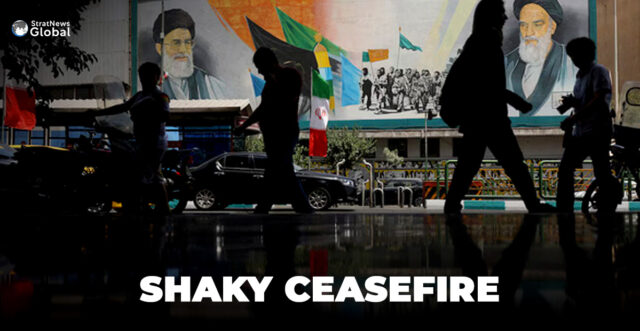After 12 days of relentless Israeli airstrikes that shook cities across Iran, killed hundreds, and forced thousands to flee their homes, many Iranians voiced relief on Tuesday following the unexpected overnight announcement of a ceasefire.
In Tehran, the Iranian capital, residents expressed hopes for clearing debris, resuming their daily routines, and, at least for now, easing the constant anxiety over further escalation and prolonged conflict.
Many Iranians who fled the Israeli strikes were also feeling relief after the ceasefire was agreed and they were glad to be able to return home after tiring, expensive stays outside the city in rented accommodation or with relatives.
Tension Eases In Iran
“I am overjoyed. It is over, and we can finally live in peace. It was an unnecessary war and we people paid the price for the authorities’ warmongering policies,” said Shima, 40, from Shiraz, withholding her name for fear of reprisals.
Just 24 hours earlier, plumes of smoke hung over parts of the capital as Israel targeted the Islamic Revolutionary Guards Corps and its paramilitary Basij militia, as well as Evin prison at the foot of the Alborz Mountains.
One man in a busy Tehran street, who also asked to remain anonymous, said, “It’s the people who are paying the price – whether our people or theirs. Both sides are bearing the cost, so it’s better that this happened sooner rather than later.”
Israel has repeatedly warned residents to leave large swathes of the city before it conducted airstrikes, clogging the highways out of Tehran with vast traffic jams.
Cash Crisis
Exhausted and running out of cash, many of them had started to return home even before the ceasefire was announced.
Arash, a 39-year-old government employee, had taken his family to Damavand, a mountain resort 35 miles east of Tehran that is popular for its clean air and bucolic setting.
They returned to Tehran two days ago. “My wife and two children were terrified of the bombings, but renting even a modest room in Damavand for any length of time is beyond my limited budget,” he said.
Noushin, 35, drove almost five hours with her husband and child to stay with her mother-in-law in Sari, near Iran’s Caspian coast. But the house was already crowded with relatives seeking shelter, and Noushin decided they were better off at home.
“My child misses her room. I miss my house. How long can we live like this?” she asked. “Even if there’s another attack, I’d rather die in my own home.”
Israel launched its surprise air war on June 13, hitting nuclear sites and killing military commanders in the worst blow to Iran since Iraq invaded in 1980, and Prime Minister Benjamin Netanyahu said the strikes could result in regime change.
However, there have been no signs of significant street protests against the Islamic Republic.
Iranians contacted by Reuters, including some who oppose the Islamic Republic and have protested against it in the past, said the airstrikes had brought people to rally around national feeling in the face of what they saw as foreign aggression.
Iranians Oppose The Republic
Still, for many Iranians, there is anger at the top ranks of the nation’s leadership, and for those returning home, the reality of a sanctions-hit economy remains.
“This is unacceptable. This is brutal. Why are we being attacked while the officials hide in safe places?” said Mohammad, 63, from Rasht.
“I place the blame on this country’s decision-makers. Their policies have brought war and destruction upon us,” he said by phone.
While Israel has repeatedly targeted both leaders and facilities of the internal security forces under the IRGC, state media have announced hundreds of arrests of people accused of spying.
Black security vehicles were seen on the streets of Tehran on Tuesday, and dissidents expressed fear of a coming crackdown by the authorities to ward off any attempt at mass protests.
Accusations of ceasefire violations on Tuesday also raised fears that the war could reignite.
“I hope they (the Israelis) remain committed to the ceasefire. History has shown that they’ve never truly honoured it, but I still hope this time they do — because it’s in our interest and theirs as well,” said one man on a Tehran street.
(With inputs from Reuters)





